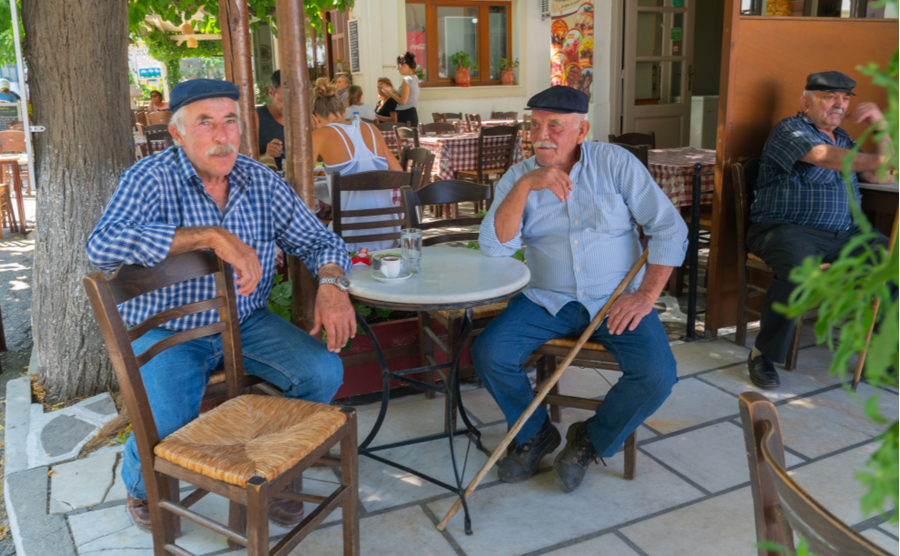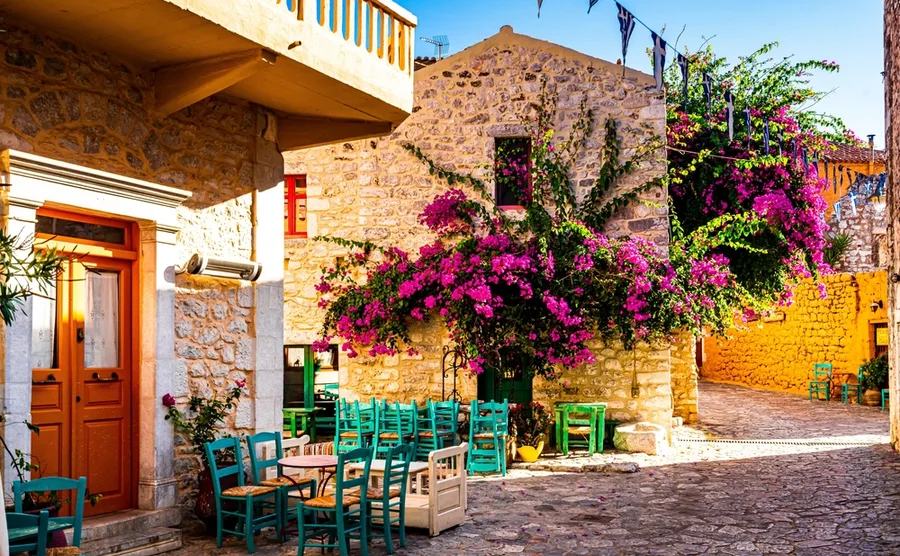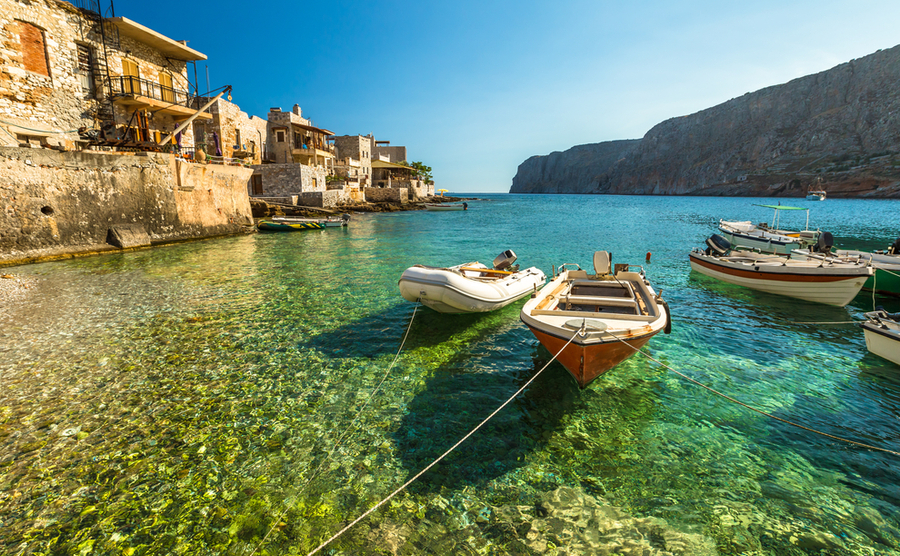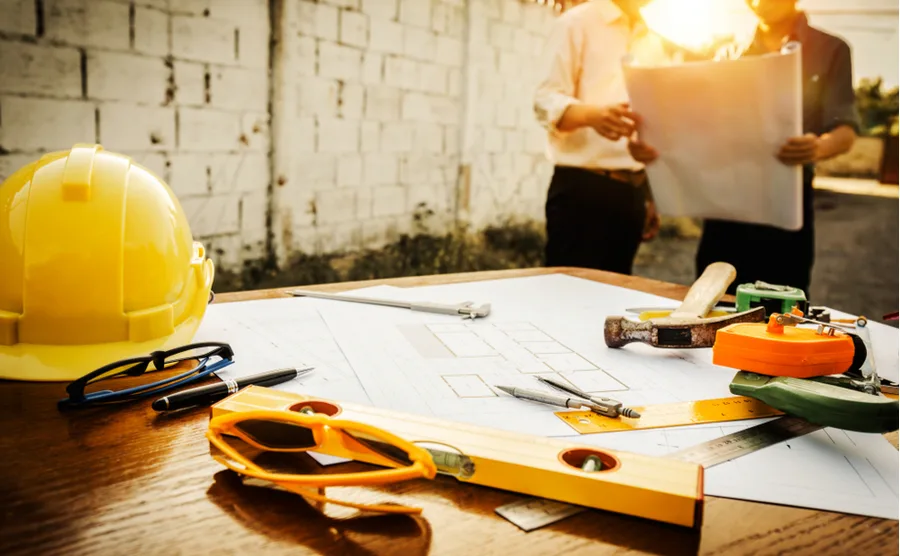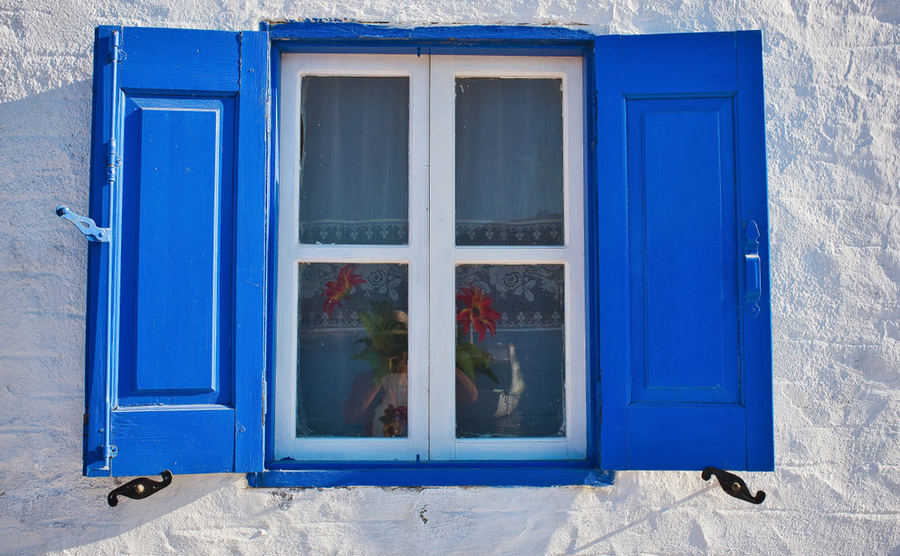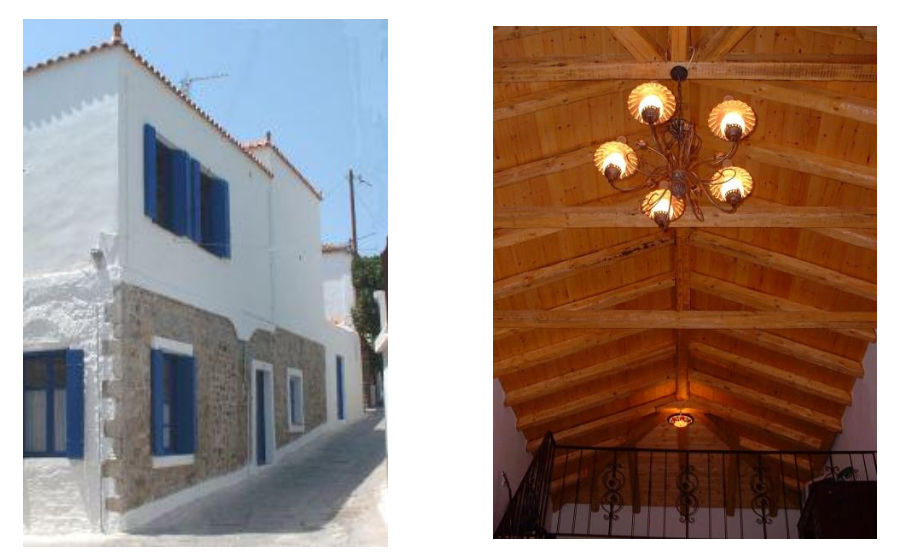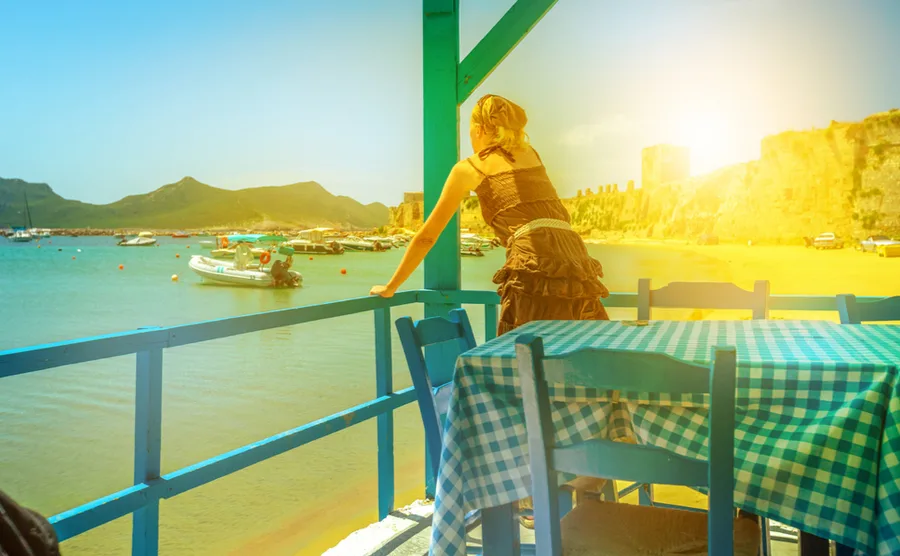Do you have fantasies of renovating an old Greek property and turning it into a truly beautiful home? Julia and her husband Marcus renovated a property in a sleepy Greek village by the sea. When they arrived, they were the only British people in the village, but they were welcomed with open arms by their neighbours. She also shares her experience of renovating her Greek property, from what she was able to do herself to employing local tradespeople.
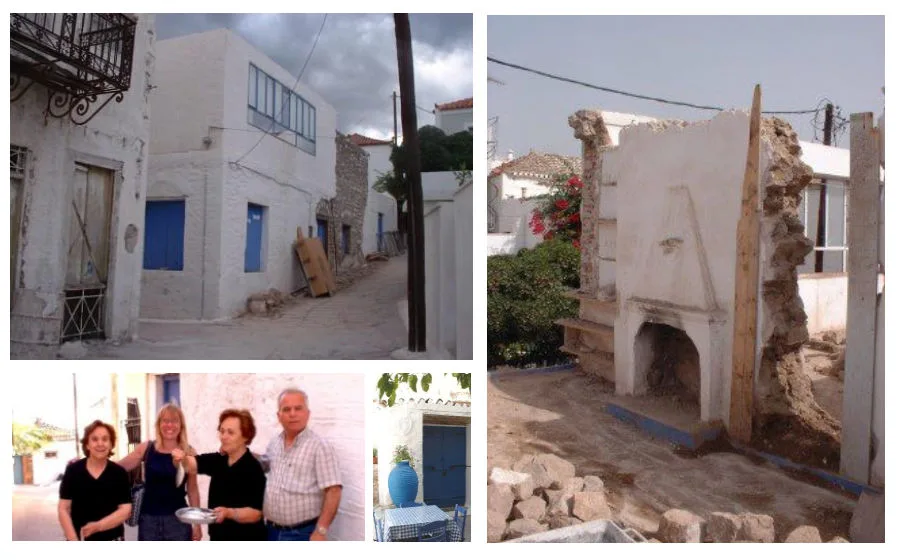
Julia shares with us her story of village in Greece, as well as the process of renovating. Her property did not even have a roof for a while. In the bottom left picture, Julia (second left) is with her neighbours.
Settling into a new home in another country can be daunting. This is our story, of how we managed to settle into a quiet seaside village in Greece.
In a sleepy Greek village by the sea, a few old men sit in front of a café. They all wear shirts and twiddle with their rosary beads. All the chairs face the road and the waterfront. Not much is happening, they see the children walking to school, a stray cat wandering by, and they wait to see the fishermen come in with their catch.
However, on one particular morning, a British guy comes marching past in a hurry, wearing a white t-shirt, Karki shorts, and boots. This was my husband, Marcus, rushing back and forth between the architects and the lawyer’s office. On the third march past, the old men smile and salute him. They now have something new to talk about. “I hear an English couple have bought the house opposite old Costa’s”, “Apparently, they are going to live here and renovate it themselves”.
A good first impression
When you first arrive in a village, your first impressions and the way you feel about the place are very important. It’s wonderful when you walk into a house or village and get that tingling feeling that makes you say “Yes, this is it. This feels like home”.
However, you should also be aware that the local people will be judging you too. Word travels fast in a small village, and you want to make a good impression. This doesn’t mean showing off your wealth, it is more important to be friendly and let them know how much you love the place. Equally important, is to take an interest in them and the local culture.
Only British in the village
When we arrived, we are the only year-round British people in the village. Other than us, there is one English woman who had married a local Greek and had children here. She runs a restaurant and small hotel and is very much part of the community. Therefore, she had already paved the way for those of us who followed.
However, we were still a novelty, and people were understandably interested in where we came from, and what we were planning to do to the house.
Learning the language
It helped that my husband taught himself some Greek before we arrived. The Greek people certainly appreciate you at least making an effort to try and speak their language. Some also want their children to have the opportunity to learn English from an English “Mother tongue”. By chance, we were talking to the guy in the phone connection shop, and he asked if I’d teach English to his daughter, Elena. Going to their home regularly gave me an insight into real Greek life and we became friends.
We were invited to Elena’s birthday party with all the family. It was a lovely experience sat at a long table by the beach, eating and enjoying their company. This is when I discovered why learning English was so important to her father. His brother had travelled from Belgium for the party and his eight-year-old son stood up and sang Happy Birthday in perfect English. Although, it did make me smile, because he sang it so dramatically and rather like a vicar.
Our house in a Greek village
We bought an old stone house in a beautiful seaside village in the Peloponnese. It was was run down and had a bowing roof, but we knew as soon as we stepped inside, that it had loads of potential. It hadn’t been lived in for many years and we couldn’t get through one upstairs external door because a bougainvillea had grown over it. However, it had lots of rooms, thick stone walls, blue shutters and a small balcony with a glimpse of the sea. Being on a hill, in the middle of the village, the stone streets were very narrow, just wide enough for one vehicle.
Renovation begins
We employed a building contractor, recommended by the estate agent, to start the structural work before we moved out there. We were going to have to stay in rented accommodation until the house had some habitable rooms in any case. So, it made sense to not move over until the house was at a point where we could get more hands on with the work ourselves. We wanted to employ local people when needed, but do most of the work ourselves.
Staying local
Fortunately we moved over in the winter, so were able to negotiate a good price on a holiday rental apartment. Each day we could walk to our house, passing shops and cafes. We became a familiar sight and would pop in for a coffee. Maria the café owner would let us know what was happening in the village and recommend where we could buy things we needed.
Bad contractor
When we arrived at our house on that first day, we discovered the contractor had removed the roof and taken away part of the end wall (that had a crack in it). He’d then left everything exposed to the rain. Subsequently, he kept delaying and trying to add more onto the bill. We discovered he had a bad reputation for this. So, we paid him for work done and let him go.
Greek speaking friend
The contractor was very intimidating, telling us he had a high standing in the village. He tried to get us to pay more money. At the meeting he thought he’d be able to get the better of us, as we didn’t speak perfect Greek. But fortunately, we had befriended a French gentleman who had a holiday home here. He was born in Greece and was very supportive and helped with some of the building terms. Making friends with someone early on, who speaks English and Greek, can be very helpful. He also helped us speak to customs to get our container released.
A tradeperson’s quote
We found that it was actually quite common for a tradesperson’s quote to not include everything you think it should. They think they can get away with asking for more money later, to finish the job. The perfect example was the carpenter we got to make and fit us some windows. He arrived to fit them with no glass and no hinges or handles. He said we would have to pay extra for them.
Keeping the traditional look
However, we did get one bit of luck. I spotted some old wooden windows stood up against a house, that was having new plastic ones installed. A chat with the owner resulted in us getting the two we needed, for free. They were in good condition and perfectly matched the original windows and shutters on the rest of our house. The previous owner had an art studio and had put in a large ugly metal framed window. Now we could replace it with two wooden ones painted in a traditional Greek blue.
Working with the labourers
My husband found two experienced labourers and employed them directly to complete the earthquake proof sill around the top of the wall, rebuild the metre thick stone wall, and do all the plastering. At first, he laboured for them, while they taught him how things were done in Greece. Then he worked alongside them. They couldn’t believe we were working too and not just giving orders.
Dream roofer
We were very fortunate with the roofer. Vassilis had moved back to the village after working in Canada, and had a hard-working mentality. With six men he built a timber framed roof with roman tiles, in just three days. The timber work was so good we decided to leave it exposed to the living area. He also gave us lots of advice about who to trust in the trades.
Supportive neighbours
Elderly neighbours were very interested in what we were doing. But, once they saw that we were restoring the house and not painting it some awful colour, they were very supportive. On one occasion a delivery of sand had been dumped in the street outside our courtyard gate. When we arrived, a policeman was there and started shouting at us. Thankfully, our elderly neighbour, Lula, came out and began telling him off, like he was a naughty child. Basically she told him, we were doing a good thing restoring an old property and that he should be more supportive. So, he simply gave us a time limit to shovel in the sand and quickly left.
Gaining trust
Considering this is a seaside village, we were very fortunate that there was a supermarket with a builder’s yard attached, both owned by Stelios. He very quickly trusted us with a tab for our building supplies, which we promptly paid each month. It was so easy to just pop down the hill for that extra bag of cement.
He also found us rather amusing, and nicknamed my husband “Tony Blair”, as he was the only English person he had heard of. One day we went to pay our account and he wasn’t there, and the staff member couldn’t find it under our name. So, we said, “Try Tony Blair”, and there it was. It was just a shame he wasn’t actually paying for it.
When not to work
When renovating in a village you have to be aware of when it is considered acceptable to work and when it is not. Especially if you are being noisy. It doesn’t make you popular with the neighbours if the silence is broken during siesta or on Sunday. You should also make a note of bank holidays and local festival dates.
One day, I popped up the road to the green grocers, leaving Marcus plastering back at the house. Although the shop was open, I was told it was about to close at lunchtime for some kind of festival. The grocer’s family were setting up tables and food in front of the shop. They insisted I go and get Marcus and join them. We were made so welcome by the whole family, especially the elderly grandparents, who handed all the men a half pint glass of ouzo. Politely we tried to drink it, taking the old man’s advice to eat a bit and sip a bit. We slept well that afternoon and right through to the next morning.
Don’t flash the cash
I’ve seen foreign buyers make the mistake of waltzing into town, thinking they are better than the locals. They employ tradespeople and pay them whatever they ask, without checking they haven’t been overcharged. They spend lots of money in the restaurants and boast about how many friends they have made. Remember, a person you spend money with and calls you friend, may not be a true friend. True friends help each other out, without asking for money.
Small gestures mean more
Our neighbour Costa was in his eighties, so we told Lula if they ever needed help with anything to let us know. Lula occasionally asked for help with changing a lightbulb, or lifting her husband into the chair. On days when he was well enough to join the men down at the café, someone would always drive him back up the hill. Our Labrador, would see him coming through the low open window and Costa would call him to check his rose garden for cats.
We took an interest in their past lives and discovered Costa was a tailor. After he died, Lula gave us his old sewing machine and a photo of him working at it. We made a table to sit it in, and displayed it in our hallway. Lula would come and put a rose from his garden in a vase we kept by it.
Accept the Greek way of life
At first, the Greek way of life took some getting used to. The church bells rang every half hour, day and night, and the family next door would be eating outside, after we had gone to bed. One evening, we heard their a tumble drier making a thumping sound and found out it was one they used just to spin an octopus in, to tenderise it. Much less effort than banging it on a rock. We very quickly got used to working early in the day when it was cooler, taking an afternoon siesta and eating later. However, Marcus still has to master walking slow, rather than marching from place to place.
Attending community events
To be seen to be part of the community we went to all the community events. Such as the Easter celebrations, when the fishermen came into the port carrying coloured flares, accompanied by dramatic music. Then there was the carnival, with Yiannis the florist leading the procession dressed as a clown.
The most entertaining show took place in the school playground. First we were treated by a choir from a small inland village. What they lacked in talent, they certainly made up for in enthusiasm. Then local people sang songs from musicals. The classic moment was when the butcher sang “Memories” from the musical “Cats”. He began singing in his best tenor voice, and then a tall, slim lad came on stage wearing a black Lycra leotard and cat tail. He was skipping around, doing the occasional little jump. I don’t know how the butcher managed to keep singing with a straight face. We were covering our mouths trying not to laugh out loud.
Buy local
It’s good to support the local economy and we always buy local when we can. The shop owners recognised us, and treated us like regulars, even when we hadn’t been to their shop for several months. Then of course, is the weekly market which sells the biggest fruit and tomatoes I have ever seen. We had to get a wheeled shopping basket to drag all our purchases up the hill. Inevitably, we would run into an old lady also pulling her shopping up the hill, or carrying bottles of water. So, we would end up pulling hers too. On one occasion her carrier bag full of tomatoes split, and it was quite an amazing sight to see all those tomatoes rolling down the hill. On that stone paving it was like watching a spread out marble run.
We found the more we interacted with the locals, whether in the street or in the shops and cafes, the quicker we settled in.
Find homes in Greece via our property portal.
Do you want to renovate a home in a Greek village?
Over on our property portal, we have loads of properties that are opportune for trying your hand at renovation. Many of these properties can be purchased for as little as €50,000 – we have over 300 for €100,000 or less. So, if you have a creative imagination and hands built for craft, you could have your own adventure of transforming a rundown Greek property to a magnificent home.


